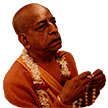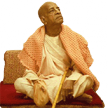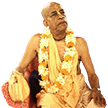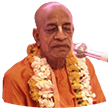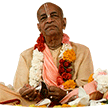Knowledge of God - an essential subject: Difference between revisions
(Created page with "Category:Essential Subjects <!----------------------- edit below this line -----------------------> <!------------------------ begin introduction text below --------------...") |
(Vanibot #0041: Moves Choose Another box to the end) |
||
| Line 2: | Line 2: | ||
<!----------------------- edit below this line -----------------------> | <!----------------------- edit below this line -----------------------> | ||
<!------------------------ begin introduction text below ------------------------> | <!------------------------ begin introduction text below ------------------------> | ||
Pure devotees of the Lord are not very much concerned with philosophical speculation in regard to transcendental knowledge of the Lord. Nor is it possible to acquire complete knowledge of the Lord. Whatever little knowledge they have about the Lord is sufficient for them because devotees are simply satisfied in hearing and chanting about the transcendental pastimes of the Lord. This gives them all transcendental bliss. But some of the pastimes of the Lord appear contradictory, even to such pure devotees, and thus Uddhava asked the Lord about some of the contradictory incidents in His pastimes. The Lord is described as having nothing to do personally, and it is actually so because even in the creation and sustenance of the material world, the Lord has nothing to do. It seems contradictory, then, to hear that the Lord personally lifts the Govardhana Hill for the protection of His unalloyed devotees. The Lord is the Supreme Brahman, the Absolute Truth, the Personality of Godhead appearing like a man, but Uddhava had doubts whether He could have so many transcendental activities. | |||
Srila Prabhupada's books, lectures, conversations and letters offer a comprehensive presentation of this essential subject as seen in the Vaniquotes '''[[Vaniquotes:Category: | Srila Prabhupada's books, lectures, conversations and letters offer a comprehensive presentation of this essential subject as seen in the Vaniquotes '''[[Vaniquotes:Category:Knowledge of God|Knowledge of God]]''' category. An introduction from his books is given below in the following 8 quotes. | ||
<!-------- end introduction text and don't touch next three lines ---------> | <!-------- end introduction text and don't touch next three lines ---------> | ||
---- | ---- | ||
== Quotes from Srila Prabhupada's books == | == Quotes from Srila Prabhupada's books == | ||
<!----------------- edit quote boxes below this line -----------------> | <!----------------- edit quote boxes below this line -----------------> | ||
{{VaniQuotebox| | {{VaniQuotebox|A person who tries to understand Krsna with full knowledge and devotion by following in the footsteps of previous acaryas conversant with scientific knowledge of the Supreme Lord is praiseworthy| A person who tries to understand Kṛṣṇa with full knowledge and devotion by following in the footsteps of previous ācāryas conversant with scientific knowledge of the Supreme Lord is praiseworthy. Such a devotee can understand that all conditions of life, favorable and unfavorable, are created by the supreme will of the Lord. And when he has fully surrendered unto the lotus feet of the Supreme Lord, he does not care whether his condition of life is favorable or unfavorable. '''(Kṛṣṇa Book, Chapter 87)'''}} | ||
{{VaniQuotebox| | {{VaniQuotebox|A representative of God never claims that he is God, although he is paid all the respect ordinarily paid to God because he has knowledge of God|A representative of God never claims that he is God, although he is paid all the respect ordinarily paid to God because he has knowledge of God. One has to learn the distinction between God and the living entity. Lord Śrī Kṛṣṇa therefore stated in the Second Chapter (2.12) that every living being is individual and that the Lord also is individual. They were all individuals in the past, they are individuals at present, and they will continue to be individuals in the future, even after liberation. '''(Bhagavad-gītā 5.16)'''}} | ||
{{VaniQuotebox| | {{VaniQuotebox|Although Brahma is in charge of this material world, he is not exactly like the common living entity. Since he is liberated from the majority of the follies of the common living entities, he was in knowledge of the appearance of the S. P. of Godhead|As explained in Bhagavad-gītā, Fourth Chapter, anyone who understands the transcendental activities, the appearance and the disappearance of the Supreme Personality of Godhead is to be considered liberated. Brahmā, therefore, is a liberated soul. Although he is in charge of this material world, he is not exactly like the common living entity. Since he is liberated from the majority of the follies of the common living entities, he was in knowledge of the appearance of the Supreme Personality of Godhead, and he therefore worshiped the Lord's activities, and with a glad heart he also praised Kardama Muni because the Supreme Personality of Godhead, as Kapila, had appeared as his son. '''(Śrīmad-Bhāgavatam 3.24.11)'''}} | ||
{{VaniQuotebox| | {{VaniQuotebox|Attaining scientific knowledge of the Personality of Godhead means seeing one's own self simultaneously. As far as the identity of the living being as spirit self is concerned, there are a number of speculations and misgivings|Attaining scientific knowledge of the Personality of Godhead means seeing one's own self simultaneously. As far as the identity of the living being as spirit self is concerned, there are a number of speculations and misgivings. The materialist does not believe in the existence of the spirit self, and empiric philosophers believe in the impersonal feature of the whole spirit without individuality of the living beings. '''(Śrīmad-Bhāgavatam 1.2.21)'''}} | ||
{{VaniQuotebox| | {{VaniQuotebox|Dhrti is the fullness felt due to the absence of misery and the attainment of knowledge of the Supreme Lord and pure love for Him|Dhṛti is the fullness felt due to the absence of misery and the attainment of knowledge of the Supreme Lord and pure love for Him. The lamentation that accrues from not obtaining a goal or from losing something already attained does not affect this completeness. '''(Caitanya-caritāmṛta, Madhya-līlā 24.181)'''}} | ||
{{VaniQuotebox| | {{VaniQuotebox|If one is overcome by knowledge of the Lord's opulence, he cannot attain the Lord's lotus feet, even though he is engaged in devotional service|Unless one follows in the footsteps of the gopīs, he cannot attain the service of the lotus feet of Kṛṣṇa, the son of Nanda Mahārāja. If one is overcome by knowledge of the Lord's opulence, he cannot attain the Lord's lotus feet, even though he is engaged in devotional service. '''(Caitanya-caritāmṛta, Madhya-līlā 8.230)'''}} | ||
{{VaniQuotebox| | {{VaniQuotebox|Knowledge of the Supreme Lord is very confidential, and the supreme knowledge by which one understands Him furthers the liberation of all living entities. This knowledge is vijnana|When one is fully equipped with jñāna and vijñāna, he is perfect. Jñāna means that one understands the Supreme Personality of Godhead, Viṣṇu, to be the Supreme Being. Vijñāna refers to the activities that liberate one from the ignorance of material existence. As stated in Śrīmad-Bhāgavatam (2.9.31): jñānaṁ parama-guhyaṁ me yad vijñāna-samanvitam. Knowledge of the Supreme Lord is very confidential, and the supreme knowledge by which one understands Him furthers the liberation of all living entities. This knowledge is vijñāna. '''(Śrīmad-Bhāgavatam 5.5.10-13)'''}} | ||
{{VaniQuotebox| | {{VaniQuotebox|The highest purificatory process is knowledge of the Supreme Personality of Godhead, the purest of the pure|The combined actions of all members of society make the whole situation favorable for the upliftment of the mission of human life. The beginning of this social institution is based on education meant for purifying the animal propensities of the human being. The highest purificatory process is knowledge of the Supreme Personality of Godhead, the purest of the pure. '''(Śrīmad-Bhāgavatam 3.12.41)'''}} | ||
<!----------------- edit quote boxes above this line -----------------> | <!----------------- edit quote boxes above this line -----------------> | ||
''' | '''Knowledge of God - [[Vaniquotes:Category:Knowledge of God|explore more within this category]]'''. | ||
{{EsentialSubjectTotal}} | {{EsentialSubjectTotal}} | ||
<div style="float:left;"> | |||
{{EssentialSubjectnav}} | |||
</div> | |||
__NOTOC__ | __NOTOC__ | ||
__NOEDITSECTION__ | __NOEDITSECTION__ | ||
Latest revision as of 16:39, 22 November 2020
Pure devotees of the Lord are not very much concerned with philosophical speculation in regard to transcendental knowledge of the Lord. Nor is it possible to acquire complete knowledge of the Lord. Whatever little knowledge they have about the Lord is sufficient for them because devotees are simply satisfied in hearing and chanting about the transcendental pastimes of the Lord. This gives them all transcendental bliss. But some of the pastimes of the Lord appear contradictory, even to such pure devotees, and thus Uddhava asked the Lord about some of the contradictory incidents in His pastimes. The Lord is described as having nothing to do personally, and it is actually so because even in the creation and sustenance of the material world, the Lord has nothing to do. It seems contradictory, then, to hear that the Lord personally lifts the Govardhana Hill for the protection of His unalloyed devotees. The Lord is the Supreme Brahman, the Absolute Truth, the Personality of Godhead appearing like a man, but Uddhava had doubts whether He could have so many transcendental activities.
Srila Prabhupada's books, lectures, conversations and letters offer a comprehensive presentation of this essential subject as seen in the Vaniquotes Knowledge of God category. An introduction from his books is given below in the following 8 quotes.
Quotes from Srila Prabhupada's books
Knowledge of God - explore more within this category.
Vanipedia has now over 903 introductory articles compiled from Srila Prabhupada's books under the series titled Essential Subjects. All these articles can be seen in the Table of Content on the right side of this article and also here in this Umbrella Category. Browse through them to relish the breadth and depth of Srila Prabhupada's teachings - There is a subject for everyone.
